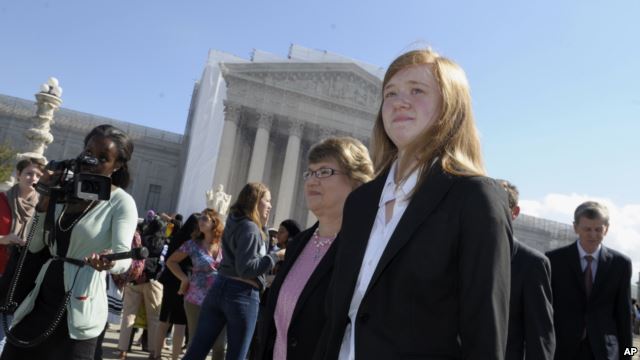VOA慢速英语:美最高法院重审平权案例
The United States Supreme Court said last week it will re-hear arguments on a controversial college admissions policy. The case involves affirmative action, the custom of helping groups that have been treated unfairly in thepast.
 |
| Supreme Court Affirmative Action |
The Supreme Court plans to hear the case of Abigail Fisher for the secondtime. Ms. Fisher, a white female, was denied admission to the University ofTexas at Austin in 2008. She says the university’s affirmative action policydiscriminated against her and other white applicants.
Ms. Fisher took legal action against the University of Texas. Her case went to the U.S. Supreme Court in 2013. The court sent the case back to a lowercourt, which supported the university.
In 2003, the Supreme Court ruled that schools can consider an applicant’srace as part of their admissions decisions. The court’s majority said thatschools have a “compelling interest” in having a racially-mixed studentpopulation.
Michael Yaki is a member of the U.S. Civil Rights Commission. He saysaffirmative action is a good thing. He says race should not prevent someonefrom getting into a university. But he thinks it should be a consideration whenuniversity officials want to create balance in a class.
In his words, “Our nation is stronger when people from diverse cultures anddiverse backgrounds can work, live and study together.” He adds thataffirmative action will “benefit the society and benefit our future.” Supporterssay affirmative action is needed to increase economic and other opportunitiesfor some minority groups.
Tom Fitton is president of Judicial Watch, a policy group in Washington D.C. He says colleges should make decisions based only on a student’s ability ormerit. He says race-based admissions programs are a violation of the U.S.Constitution.
“People are harmed by these decisions,” he says, “because for every personwho gets in because they are a minority, there is someone who may be leftout because they are not.”
Mr. Fitton says affirmative action hurts Asian-American students. The 2010Census found that Asian Americans make up about six percent of the U.S.population. But they make up about 40 percent of the undergraduate studentsat the University of California at Berkeley. At Harvard University, 20 percent of the first-year students are Asian. Some people say the percentage of Asianstudents at top U.S. universities would be even higher without affirmativeaction.
“The Asian American community gets harmed by this, because theireducational achievements make them excellent candidates, if it was justbased on merit,” Mr. Fitton says.
A group of Asian organizations complained to the Justice and EducationDepartments. They said Harvard University discriminates against AsianAmericans in its admission process. Commissioner Yaki does not thinkHarvard “systematically” discriminates against them. He says the universitydoes not set firm target numbers for the number of Asians it will accept.
In 1978, the Supreme Court ruled that racial quotas are illegal in employmentand college admissions.
Abigail Fisher now works at a finance company after completing studies atLouisiana State University. The Supreme Court will hear her case against theUniversity of Texas in October. The Court’s decision could have a major effecton the diversity of U.S. college classrooms in the future.
I’m Anne Ball.
Yang Chen reported this story for VOA. Adam Brock adapted it for LearningEnglish. George Grow was the editor.
______________________________________________________________
Words in This Story
controversial– adj. relating to or causing much discussion, disagreement, orargument
affirmative action – n. the custom of improving the educational and jobopportunities of members of groups that have not been treated fairly in thepast because of their race, sex, etc.
discriminate – v. to unfairly treat a person or group of people differently fromother people or groups
merit – n. the quality of being good, important, or useful
racial quota – n. a numerical requirement for hiring, promoting, admittingand/or graduating members of a particular racial group
complain – v. to report that you are unhappy or sick, or that you do not likesomething
- 频道推荐
- |
- 全站推荐
- 推荐下载
- 网站推荐




















